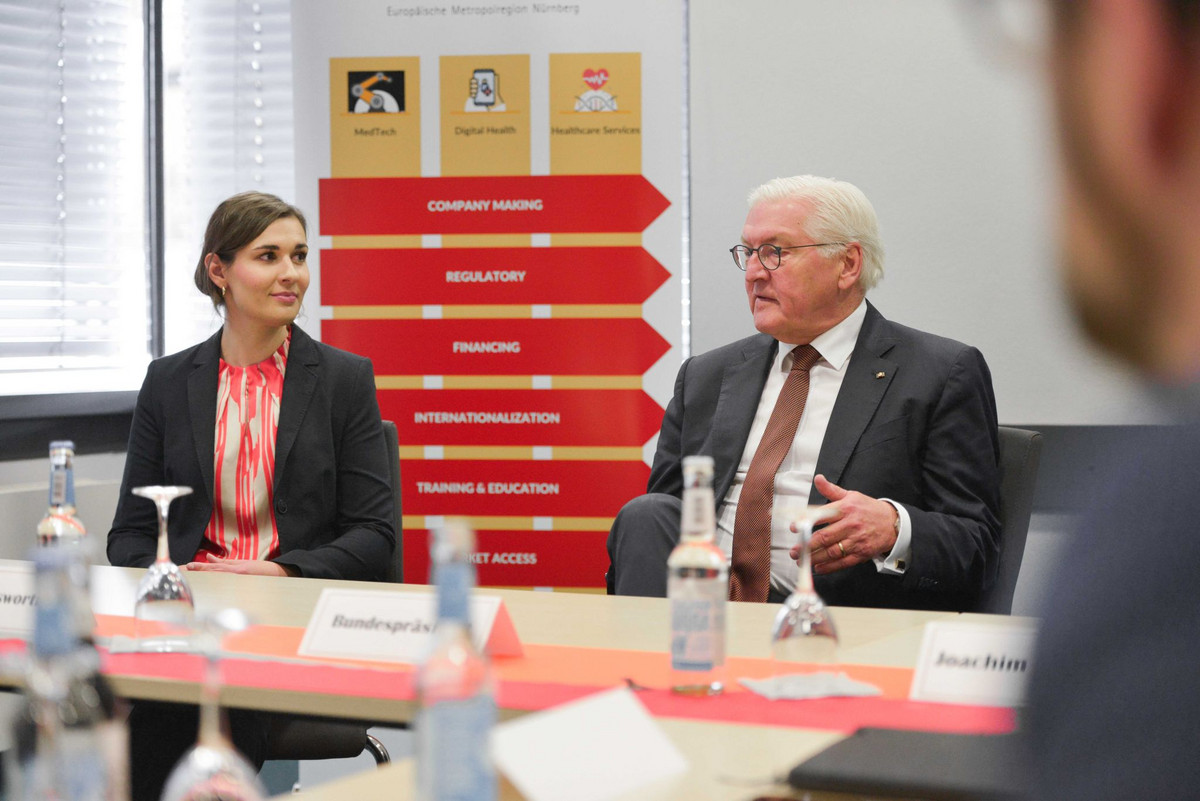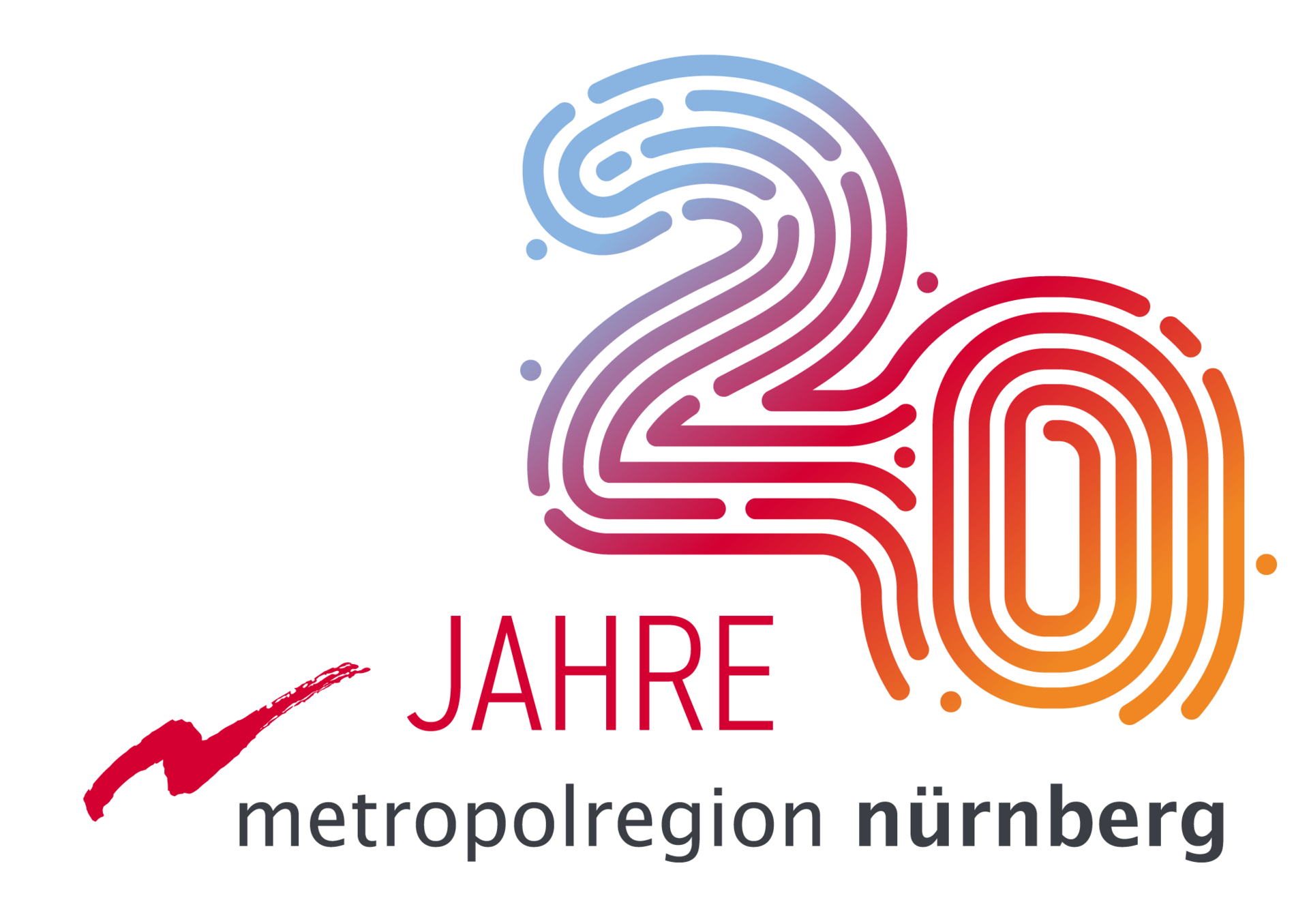The Federal President visits Medical Valley
As part of the "Workshop of Change" series of events, Federal President Dr. Frank-Walter Steinmeier visited the Digital Health Hub Medical Valley EMN e. V. on November 7, 2023.
On the way to better healthcare with innovation and courage
As part of the "Workshop of Change" series of events, Federal President Steinmeier visited the cluster organization Medical Valley EMN e. V. Five teams from the healthcare sector presented their projects to him at the Medical Valley Center Erlangen innovation center. Their goals? To face current and future challenges with determination and commitment in order to sustainably improve healthcare.
More about the "Workshop of change"
How can a successful transformation in the healthcare sector be achieved and what constitutes successful change? With these questions in mind, Federal President Steinmeier traveled to Medical Valley EMN e. V. in Erlangen to find out from start-ups, SMEs and research teams and to engage in a concrete exchange with them. The innovations presented offered the perfect conditions for this and demonstrated the enormous diversity of the companies based in the region.
Improving healthcare with digital applications and focusing on people
During his visit, Federal President Steinmeier expected not only pitches from first-class and promising start-ups, but also research projects on the way to spin-offs and medical technology innovations from joint activities of Medical Valley members that had been awarded the Medical Valley Award:
In addition to digital applications, such as the "ProHerz" app from Procarement GmbH, which provides individual and direct support for people with heart failure in everyday life, or the solution from brainjo, which aims to challenge and promote mental fitness with a combination of virtual reality, gamification and an app, the project from Portabiles HealthCare Technologies GmbH, which is dedicated to improving the quality of life for Parkinson's patients, was also impressive. High-precision gait analysis makes it possible to detect any changes in the gait pattern and draw significant conclusions about the course of the disease. The necessary therapy adjustments can then be initiated. Even though these applications utilize many of the advantages of digital prevention, diagnostics and therapy, it should not be forgotten that the focus is always on the people for whom they were developed.
"There are success stories in Medical Valley that began here, but also those that have already been written - both together form a strong foundation for the innovative spirit that characterizes the cluster." Prof. Dr. Dr. h.c. Jürgen Schüttler, Deputy Chairman of the Supervisory Board, Medical Valley EMN e. V.
Two examples of this are the GraspAgain research team and the company VEC Imaging. The GraspAgain team from Friedrich-Alexander-Universität Erlangen-Nürnberg received the Medical Valley Award at the beginning of the year, which is endowed with 500,000 euros and is intended to support research teams at Bavarian universities in spinning off their ideas. The idea behind Grasp Again? To restore the hand function of people with neuromuscular impairments. To this end, GraspAgain's research focuses on a non-invasive brain-machine interface and mechatronics.
The goal of VEC Imaging is to increase the performance and image quality of X-ray technologies while reducing costs in order to realize better and more sustainable healthcare. Unlike the other teams, the company is no longer a start-up, but is already a global leader in the development of nanotube-based multi-beam X-ray tubes (MBX).
Improving start-up conditions through holistic and transdisciplinary exchange
President Steinmeier then engaged in an open discussion with the teams and Prof. Jürgen Schüttler, Deputy Chairman of the Supervisory Board of Medical Valley EMN e. V., Dr. Florian Janick, Mayor of the City of Erlangen, Prof. Joachim Hornegger, President of Friedrich-Alexander-Universität Erlangen-Nürnberg and Anna Goldsworthy, Managing Director of Medical Valley EMN e. V. The focus was primarily on the conditions that are necessary to make such innovations possible. What resources are needed and how can talent and potential be scouted, encouraged and promoted even more intensively? How can successful change in healthcare be sustainably supported and proactively shaped? During the fruitful dialog, it quickly became very clear which course needs to be set for the future:
- The starting conditions for founders must continue to be improved in order to make the topic of start-ups attractive in the long term. The experts emphasized the importance of a supportive legal framework for start-ups. This includes the simplification of business start-ups, the reduction of bureaucracy, more flexible financing options and the creation of tax incentives for investors.
- The topic of "female founders" must be given greater visibility in order to initiate an urgently needed shift in the hitherto one-sidedly male-dominated start-up culture.
- The experience reports from the start-up teams, which were characterized by industry-specific issues such as regulatory hurdles, lengthy development cycles and difficulties in conducting clinical trials, made it clear that there is also a great need for action here.
In summary, the experts in the discussion with the Federal President emphasized the need for a holistic, transdisciplinary approach to start-up promotion and support. This requires cooperation between politics, research, business and founders in order to create a conducive ecosystem for start-ups.
"Nevertheless, I am on the road with the workshop of change to show that we do not have to face these changes and this transformation with fear, but that each of these changes also offers new opportunities for our science and business location. And that is why it is important that we do not suffer the transformations that will take place, but that we shape them. And I am firmly convinced that we have the potential to do so," said the Federal President.




